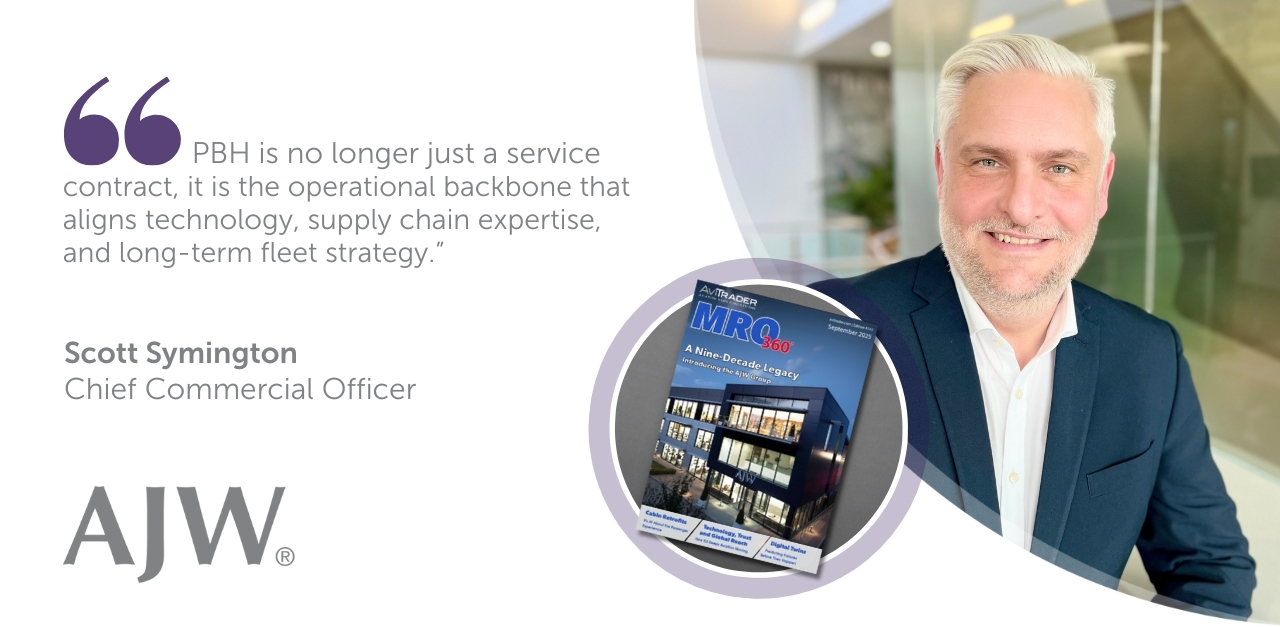

24/7 AOG Critical Response
Hotline![]() UK +44 1403 798888US +1 877 780 2008
UK +44 1403 798888US +1 877 780 2008
Our award winning global AOG service is manned 24 hours a day, 365 days a year.
Please call +44 1403 798888 or email aog@ajw-group.com.

30 Sep 2025

As airlines face increasing pressure to optimise costs and improve fleet reliability, Power-by-the-Hour (PBH) agreements are becoming a cornerstone of modern maintenance strategies. AviTrader investigate the growing demand for PBH solutions in this deep dive interview with AJW Group’s Chief Commercial Officer, Scott Symington.
Speaking to AviTrader’s MRO 360° magazine about AJW Group’s PBH agreements, Scott Symington discusses the rise in PBH’s popularity, what is driving its growth, and where they’re headed in the future.
PBH agreements continue to go from strength to strength, what are the factors behind this growth, asks MRO 360°?
“PBH continues to thrive because it answers two fundamental airline challenges: financial predictability and operational reliability,” says Symington.
“Traditionally, maintenance was reactive and capital-intensive with carriers having to budget for sudden component failures or invest heavily in spares stockpiles. PBH flips this model by shifting costs into a fixed hourly rate. This allows airlines to plan with certainty while transferring much of the risk to the service provider,” he continues.
How do PBH agreements support fleet growth and modernisation for airlines?
Symington replies that “Scalability is one of PBH’s greatest strengths. As low-cost and ultra-low-cost carriers add aircraft rapidly, contracts can be extended to cover new units without lengthy renegotiation.”
The Group CCO mentions Air Transat, as an example, which expanded PBH coverage to its A321ceo and A321neo fleets. This decision ensured maintenance support scaled seamlessly alongside its modernisation. For Air Transat, PBH was a strategic enabler of growth and technology transition.
The magazine then asks Symington about the additional benefits, beyond cost predictability, for airlines under PBH.
Symington explains that a major advantage is warranty recovery “under our PBH programmes, we recover around three quarters of eligible claims, which significantly reduces operating expenditure,” he says.
“Another strength is the ability to outsource repair management and supplier management to AJW - allowing us to pass the cost benefits of our size and scale onto our customers.”
Thirdly, PBH simplifies logistics, he states, sharing that AJW Group centralise warehousing and global distribution, making critical parts available worldwide – without airlines needing to manage these complex supply chains themselves.

How is PBH adapting to meet the industry’s drive to improve efficiency and sustainability?
Symington explains that “leading providers now embed predictive maintenance analytics into their programmes, to forecast component wear and intervene before a failure occurs. This reduces in-service issues, extends component life, and boosts aircraft availability.”
Sustainability is another critical dimension, he acknowledges. “The overall size of our pool is significantly reduced compared to each airline holding its own inventory pool, therefore reducing the overall amount of raw material and carbon footprint required to support eight hundred aircraft.”
Looking to the future, how is the PBH model shaping the global MRO landscape, enquires MRO 360°?
Symington replies that the MRO market continues to grow at around 6.2% annually. PBH is capturing an increasing share of this, because it integrates financial discipline, operational resilience, and sustainability.
The model is also expanding geographically, with new PBH contracts in Latin America, Africa, and Asia-Pacific - proving global viability, states the CCO.
Symington emphasises that “PBH is becoming foundational to airline–MRO partnerships. It’s no longer just a service contract, it is the operational backbone that aligns technology, supply chain expertise, and long-term fleet strategy.”
He concludes by stating that “PBH is shaping the future of maintenance by turning uncertainty into predictability, and complexity into managed service. That’s why airlines and operators worldwide are embracing it as their preferred model for the next generation of aviation.”
Looking to use PBH to support your fleet? Talk to our experts today.